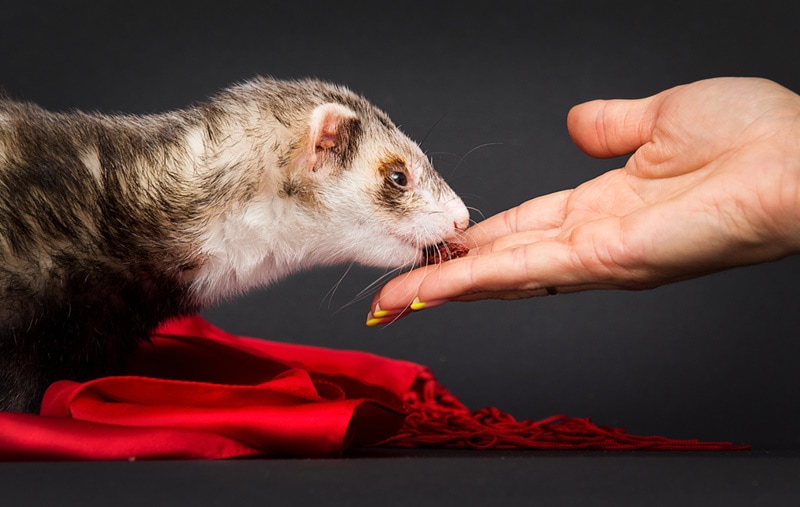Do Ferrets Smell? Vet-Approved Hygiene & Odor Control Tips

Updated on
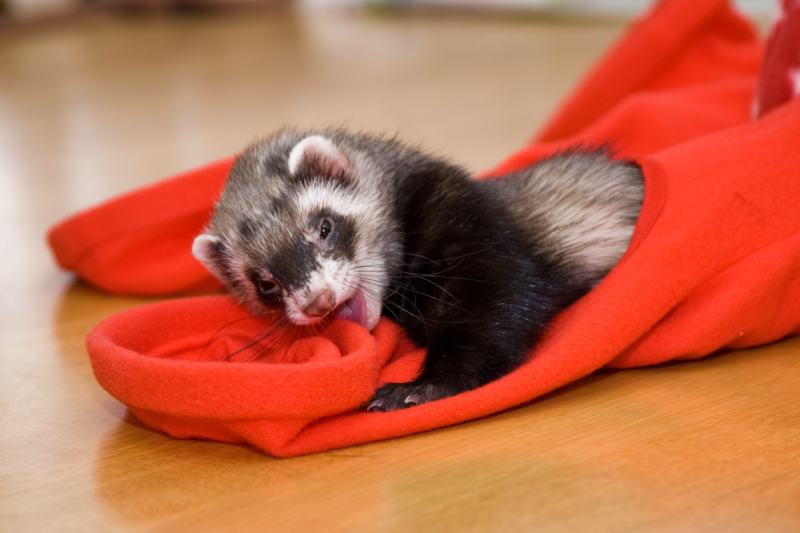
If you’re considering adding a ferret to your home, you may have read or heard that ferrets have a distinctive smell or will likely stink up your home. But do ferrets smell? Ferrets have a somewhat “musky” odor. This odor is much stronger in pets that aren’t sterilized (especially intact males). However, ferrets that are adopted as pets are often sterilized and rarely produce a strong odor under normal circumstances.
In fact, many ferret owners say they like their pets’ distinctive odor! Even if you’re sensitive to odors, most owners will eventually adjust to the smell. In this post, we’ll look more closely at the biology behind the distinct ferret smell and discuss what you can do as a pet owner to help manage it.
How Bad Do Ferrets Smell?
It is somewhat peculiar to say that ferrets smell bad, as their natural odor is appreciated by some folks. Intact males produce a strong, musky odor. They often urinate on their “belongings.” This includes other ferrets in their business and even you! However, as pet ferrets are neutered before adoption (or they should be), this odor is largely neutralized in most pets.
The smell is not at all bothersome to long-time ferret owners. Even though it bothers them at first, most owners eventually get used to it.
How much a pet ferret smells will also depend on a few other factors which we will touch on in this article. You probably won’t notice the smell much if you regularly groom your ferret and keep their cage clean. However, to associate their natural odor with the adjective “bad” is sure to get some ferret enthusiasts bothered!
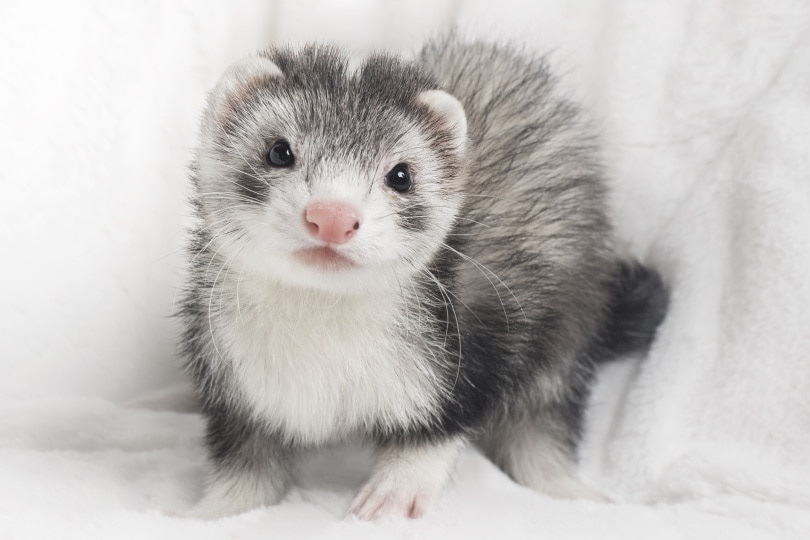
Why Do Ferrets Smell?
Like dogs and cats, ferrets are born with anal glands on either side of their rectum. The anal glands, in particular, are responsible for the musky smell that ferrets naturally emit and use to mark their territory. A procedure known as de-scenting is used to remove the anal glands from most pet ferrets at a relatively young age (this is often done in conjunction with their neuter procedure).
However, a ferret’s skin also contains sebaceous glands that secrete substances that give ferrets distinct and characteristic odors. If a ferret has not been neutered or spayed, they will likely produce a very strong odor.
Please note that, for health reasons, all pet ferrets should be sterilized shortly after they are weaned. This is done by a trained veterinarian. Pets should only be left intact in the hands of an experienced, licensed veterinarian or breeder.
In most instances, the “smell” associated with healthy ferrets isn’t always coming from the ferret. Rather, it tends to become overbearing when the ferret repeatedly deposits their scent on inanimate objects for long periods of time. These objects include their hammock, litter boxes, and favorite toys or resting spots.
Do Ferrets Make Your House Smell?
Ferrets don’t stink up the entire house. The ferret should only have a subtle musky smell when it is close to your nose and you sniff it. However, your ferret’s bedding accumulates skin oils, which may build up on the bedding in other places in the house. Inadequate cleaning of areas where they frequently play could result in a foul odor.
You probably need to clean more thoroughly or frequently if your house smells like a ferret. Wipe down all hard surfaces that your ferret comes into contact with often, if not every day, as these surfaces can absorb oils, which might leave them smelling bad.
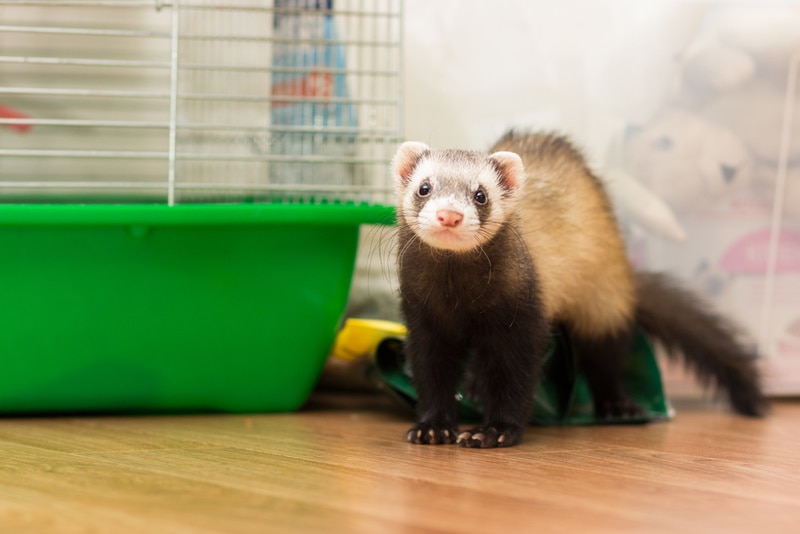
Should I Bathe My Ferret?
Unfortunately, excessively bathing your ferret will make the scent worse rather than eliminate it. Washing your ferret removes the oils from its fur, which protects the coat and skin. When they are rinsed away, the oil glands go into overdrive to produce additional oils, making the ferret smellier. Furthermore, your ferret’s skin might become dry and flaky after a bath, which can cause other skin issues.
At other times, a bath might be necessary if your pet has soiled themselves and is smelling unpleasant. Ferrets are not opposed to napping in weird places, including their litter boxes. If they roll around in their own waste, they can indeed become far too smelly to tolerate. In such a situation, you can bathe your pet. If you’re not confident with bathing your pet, you should have a professional grooming service do this for you.
Should I Remove My Ferret Scent Glands?
As we mentioned before, most ferrets that are adopted as pets undergo the procedure to be desexed and de-scented. This is often done shortly after ferrets are weaned, at around 8 to 12 weeks of age.
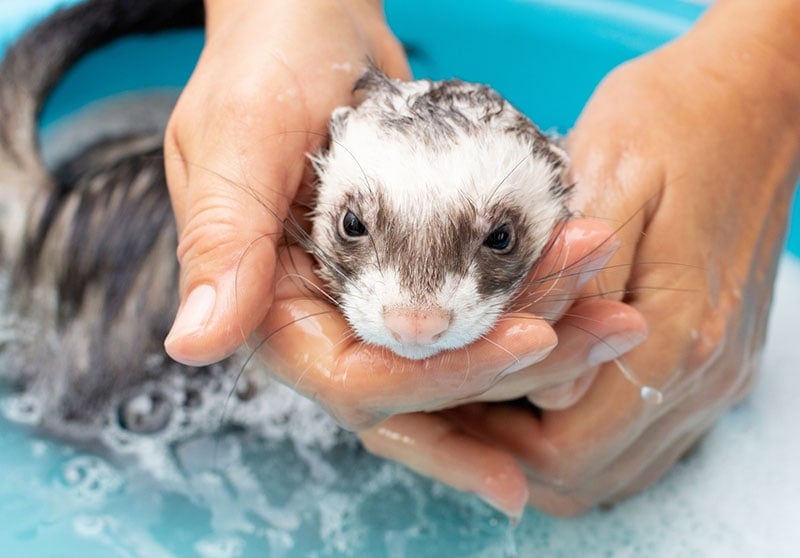
The 7 Tips for Reducing Ferret Smell
Sadly, most scented products mask the ferret odor with another odor, leaving you with a new, unpleasant combination. Here are some ways you can reduce the smell of your ferret:
1. Neuter/Sterilization
Ferrets that aren’t sterilized produce a strong, musky odor. Under normal conditions, no pet ferret should be adopted while still being intact. For their health, they are sterilized while still young. During this procedure, their anal scent glands (which contribute to the production of these scents) are also removed.
It is very important to note that a female ferret should be sterilized well before her first heat to prevent life-threatening consequences, such as the development of hyperadrenocorticism. A female that is in heat will stay in heat until she’s mated, and this produces a physiological state of stress within their body.
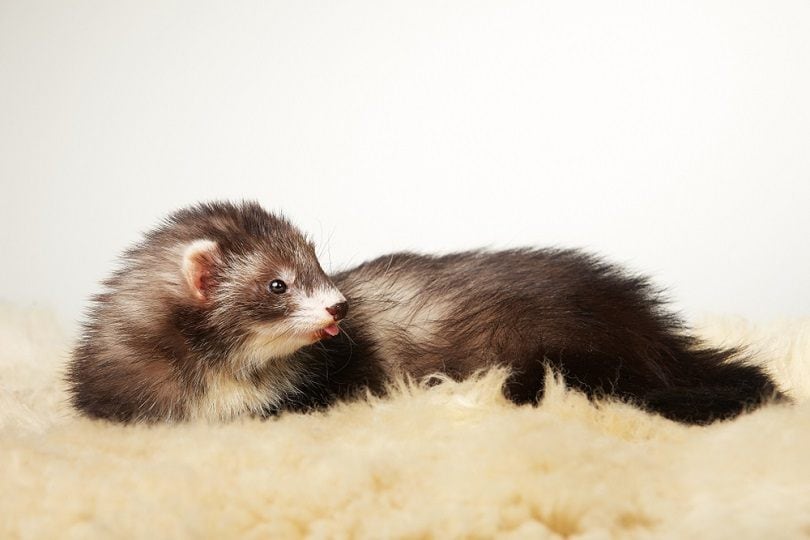
2. Nutrition
Give your ferret high-quality food that is high in animal-derived protein and fat. Ferrets are obligate carnivores and shouldn’t be fed plant-based foods.
3. Grooming
Checking their ears while they cuddle or play should become a daily ritual. Ferrets naturally develop a dark waxy build-up in their ears, which has a pungent smell. When this wax starts accumulating, it’s necessary to clean their ears with cotton swabs.
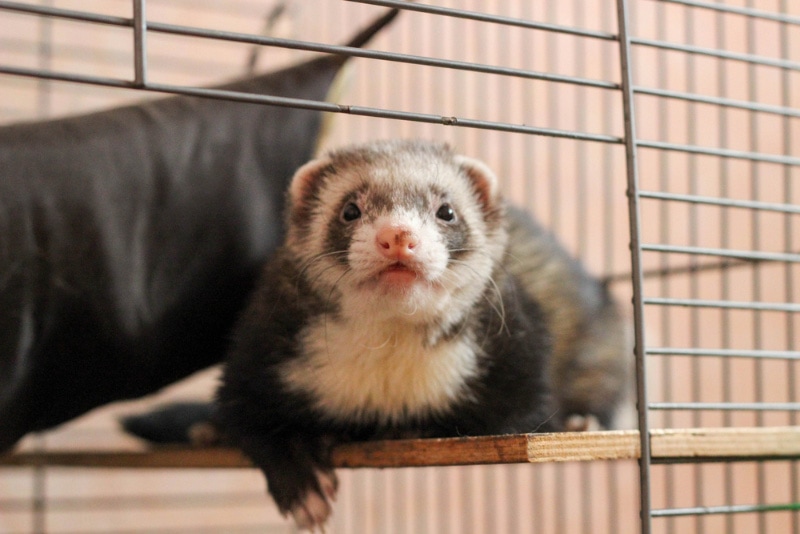
4. Check Your Pet’s Ears
Checking their ears while they cuddle or play should become a daily ritual. If you notice a pungent smell from their ears or excessive wax buildup, you should have your pet looked over by your vet.
5. Stay on Top of Hygiene & Cleanliness
A clean habitat is essential in preventing foul odors. Spend some time each day cleaning the litter box and wiping down surfaces. Provide beds, hammocks, and blankets so you can switch them out frequently and thoroughly wash them.
6. Focus on Your Ferret’s “Favorite” Spots
For odors to be kept at bay, make sure that their living environment has adequate ventilation. Keep the area where your ferret lives away from windows, and ensure there is adequate airflow.
7. Enclosure Location
If a ferret is intact and hasn’t been spayed or neutered, their odor will be more powerful. Spaying and neutering your ferret will reduce their natural odor.

Conclusion
Ferrets emit a musky odor. The scent glands they use to mark their territory further contribute to their distinct smell. Most ferret owners grow accustomed to this musky smell and eventually stop noticing it, but occasionally, the stench can be stronger than it should be. Fortunately, reducing the odor is possible with simple cleaning and grooming routines and can be kept to a minimum by knowing what causes the typical smell.
Featured Image Credit: Olga Pysarenko, Shutterstock




